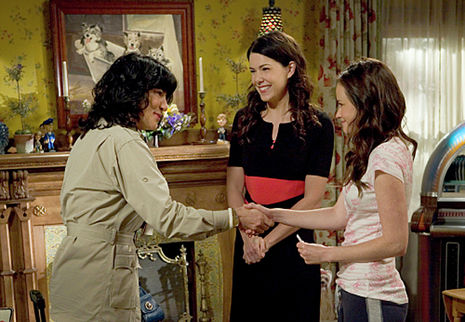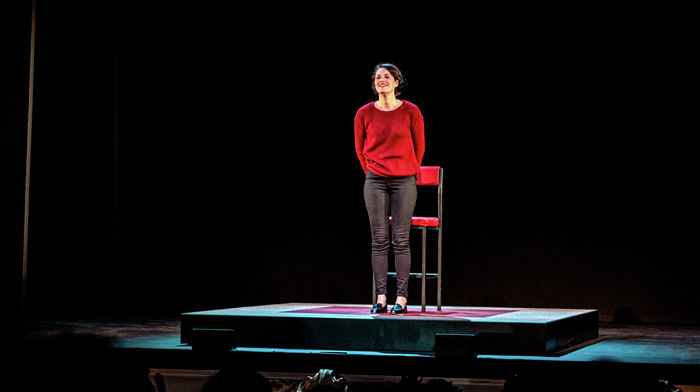Trivial discrimination in Gilmore Girls: Why we shouldn’t ignore it
Tanya Singh questions whether ‘trivial’ racism has become so intrinsic to Hollywood that discriminatory remarks in heart-warming shows like Gilmore Girls go overlooked

Content Note: Discussion of racism
Lorelai’s quippy comments, the charm of Stars Hollow and the entire existence of Luke Danes makes Gilmore Girls one of my favourite comfort shows. A light-hearted series exploring the loving, best-friend-esque relationship of a mother and daughter resonated with my mum and I, reflected in the brief six weeks it took for us to finish seven whole seasons. What’s more comforting than a slow-paced, picturesque drama where, no matter how badly a character messes up, they acquire a happy ending? Defined by long hours spent staring unflinchingly at my laptop, trying to revise as exams were fast approaching, Gilmore Girls offered the respite I desperately needed during the Easter break.
“It was instinct for us to ignore a singular problematic remark”
However, when Lorelai made a comment about her displeasure at Rory wanting to get Indian takeaway because it would stink up the house, the light-hearted atmosphere in my living room quickly became tense, made poignant by the fact that in that very moment my living room itself was brimming with the scent of quintessential Indian food. My mother and I looked at each other: a very specific look which clearly expressed our discomfort at the comment made. Then we swiftly moved on. It was instinct for us to ignore a singular problematic remark because we’d grown used to the not-so-subtle racism ingrained in Hollywood.
As we continued to binge watch the trivial happenings of the tight-knit walkable community, similar comments propped up and it became harder and harder to ignore. The ‘stinky ethnic food’ trope was utilised again a couple episodes later, once more referring to Indian food, with Jess suggesting that “burning down the house” would be a suitable response to ordering from “Sandeep’s”.
“My mum and I were left with a sour taste in our mouths as the episode ended”
While the characters suffered no consequences for their words, in reality the escapism of the show is immediately rendered insignificant. My mum and I were left with a sour taste in our mouths as the episode ended, an ironic contradiction, as we’d just consumed a delicious homemade meal of chana masala and chawal. There is something deeply unsettling about the perception of my ethnic food, which brings me far more comfort than a TV show ever could, being propagated as unpleasant in a timeless classic watched and adored by millions.
At the moment, and even as I write this now, I can’t help but feel silly. I’m reminded of the fact that it is just a TV show, and quite frankly, people of colour face more explicit and harmful racism on a day-to-day basis. Perhaps it is unnecessary to devote my time and energy to the critique of a heartfelt series when there are bigger issues at hand. Yet, it is still appalling that this discrimination continues to be so persistent in our society that I feel obligated to accept and ignore prejudices that seem trivial in comparison.
Is it, then, so trivial to see Gilmore Girls use a wealthy white woman abusing her power, as she fires women of colour for almost no reason at all, as comical rhetoric? On the surface level, this is perhaps simply a means of depicting Emily’s domineering and high-and-mighty personality (a token of character-building and evoking laughter from the audience.)
“Pop culture’s reinforcing of societal attitudes towards ethnic minorities must not be understated”
I’d argue that it really isn’t that funny. Instead, it speaks to a much more complex problem of the intersection between domestic work and immigrant women subjected to unjust employers and unstable employment. Seemingly minor things like this, or the entire characterisation of Mrs Kim, playing into harmful stereotypes of Asian immigrant parenthood, matter. The importance of pop culture in reinforcing societal attitudes towards ethnic minorities must not be understated.
Of course, there is a disconnect between the position Gilmore Girls has as one of my comfort shows and the immensely problematic nature of some of its content. I think there’s value in taking a nuanced approach, for there are many things that Gilmore Girls does right. Its positive portrayal of single motherhood, and its exploration of class and power dynamics are just a few of its redeeming qualities.
Gilmore Girls has a cult-following, and rightfully so. Witty humour, 2000s nostalgia and entertaining cultural references has enabled it to implant itself into countless ‘Favourite TV Shows of all time’ lists. But when so much of the media remains embedded with misrepresentations of minorities, overt stereotypes and microaggressions, it is vital that as viewers we challenge the blatant disregard that creators often demonstrate in regards to generating an inclusive space for all.
So while I will continue to enjoy watching Kirk’s misdemeanours or the gossip sessions intrinsic to Mrs Patty and Babette’s friendship the next time I’m in desperate need of a temporary break from exam season, I will simultaneously complain, criticise and condemn any aspect of it that makes me feel uneasy.
Ethnic minorities may not have been given a voice in the fictional world that is the quaint town of Gilmore Girls, but they have a voice in reality. And it is crucial that we use it.
 News / Hundreds of Cambridge academics demand vote on fate of vet course20 February 2026
News / Hundreds of Cambridge academics demand vote on fate of vet course20 February 2026 News / Judge Business School advisor resigns over Epstein and Andrew links18 February 2026
News / Judge Business School advisor resigns over Epstein and Andrew links18 February 2026 News / University Council rescinds University Centre membership20 February 2026
News / University Council rescinds University Centre membership20 February 2026 News / Petition demands University reverse decision on vegan menu20 February 2026
News / Petition demands University reverse decision on vegan menu20 February 2026 News / Caius students fail to pass Pride flag proposal20 February 2026
News / Caius students fail to pass Pride flag proposal20 February 2026










